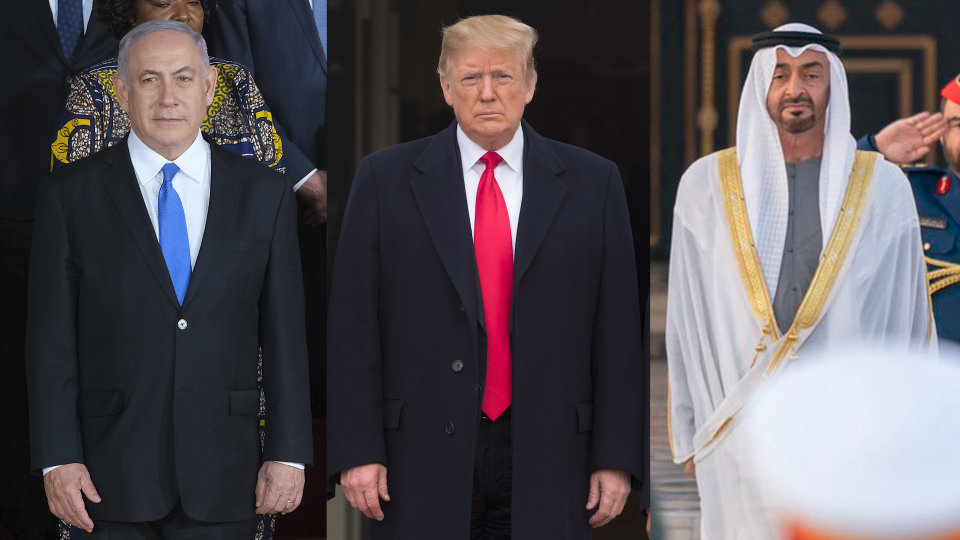IN THE MEDIA
A fortnight that has transformed the Middle East
August 20, 2020 | Allon Lee

Australian Jewish News, August 20 2020
Two explosions – one literal, the other political – have rocked the Middle East in quick succession over the past fortnight, with profound consequences.
The Beirut port tragedy on August 4 was followed by US President Donald Trump’s White House announcement on August 13 that Israel and the UAE were normalising relations. This being the first time in 26 years Israel had established full diplomatic relations with an Arab state, following Egypt (1979) and Jordan (1994).
Both events were years in the making and reveal a great deal about the Middle East in 2020.
The Beirut explosion is being blamed on Lebanese authorities for allowing thousands of tons of ammonium nitrate to be improperly stored for seven years, despite repeated warnings. But critically, Iranian-backed Hezbollah – which controls both the port and the country – is said to have opposed relocating the combustible material which could be employed in its eternal war against the Jewish state.
By contrast, the UAE and other more cautious partners in the Persian Gulf are looking to the future and can see that the Jewish state has become not only an economic and scientific powerhouse too vital to ignore, but the only force they can rely on to help check a rampant Iran.
And although the media reported the deal’s announcement as a surprise, signs of “peace treaty under construction” have been apparent since 2016. Indeed, in recent months there were swallows flying all over the place.
First, there were the UAE liveried planes that arrived in Tel Aviv carrying aid for Palestinians in May and June. Then the dramatic op-ed from UAE ambassador to Washington Yousef Al-Otaiba, written in Hebrew no less and published in one of Israel’s leading newspapers, Yediot Ahronot.
Al-Otaiba said Egyptian president Sadat’s trip to Jerusalem in 1977 inspired him to write the article. Even as he held out the carrot of better ties, he warned the Netanyahu government that extending Israeli sovereignty to areas of the West Bank in line with the Trump administration’s Israeli–Palestinian peace plan risked undoing all the progress with the Gulf states over recent years.
Despite the US and the UAE making it clear that the terms of the UAE–Israel deal are dependent on Israel not pursuing West Bank sovereignty, Israeli PM Benjamin Netanyahu still insists that policy has only been delayed, not cancelled. Naturally, these promises have not satisfied many in the settler movement and his own coalition.
The deal will nonetheless likely provide Netanyahu a welcome political boost, given that polling suggests 80 per cent of the Israeli public backs peace with the UAE over sovereignty.
This is understandable given the positive tone from UAE Foreign Minister Anwar Gargash, who said, “Over the years, several Arab states have realised that making peace with Israel, and ensuring that our Israeli neighbours feel secure in the region, is the best way to guarantee the rights of the Palestinian people, while also bringing benefits for the region as a whole.”
Notwithstanding the UAE insisting it has saved the two-state solution for the Palestinians and Gargash confirming that “there will be no embassy in Jerusalem”, Palestinian President Mahmoud Abbas responded in typical fashion, calling it a betrayal and a stab in the back. Other Palestinian factions followed suit.
As numerous analysts have noted, this deal is effectively a signal to the Palestinian leadership that, after 20 years of peace process rejectionism, they have lost the self-assigned right of veto over their fellow Arab states.
In an ideal world, the announcement of peace between two nations after decades of an official state of war would be a cause for celebration – but this is the Middle East.
Although US special Middle East envoy Jared Kushner suggested it is inevitable that Saudi Arabia will eventually follow suit, Riyadh has been silent. Yet it is understood that the Saudis gave their okay to the UAE.
Oman and Bahrain praised the deal, and there are clearly hopes in both Jerusalem and Washington that one or both may soon also establish relations with Israel.
Mauritania also praised the deal, as did Egypt. Qatar was silent and Jordan publicly cool. Iran has threatened retaliation against the UAE if they bring Israelis into the Gulf.
Turkish President Recep Erdogan is threatening to withdraw his country’s ambassador to the UAE – even though Turkey and Israel have had diplomatic relations since 1949.
From the US standpoint, with President Trump lagging in the polls, announcing the deal was a much-needed PR fillip.
Most Sunni Arab states will be pleased at that, seeing Trump’s “maximum pressure” policies against Iran as essential to curtailing Iranian power.
Yet immediately after the euphoria came a reality check, with the UN Security Council overwhelmingly reject- ing a US-sponsored extension to a UN arms embargo on Iran that expires in October under the terms of the 2015 Iran nuclear deal.
Much of the region will be strongly concerned at the prospect that Joe Biden, who was President Barack Obama’s vice-president, will bring the US back into the nuclear deal, widely seen as both empowering Iran regionally and setting Tehran on track to becoming a nuclear power in a few years.
That could have even larger long-term regional effects than either the explosion in Beirut or the political one announced in Washington. Indeed, it is this very dynamic which played such a large part in pushing Israel and the UAE into each other’s arms in the first place.
Allon Lee is a senior policy analyst at the Australia/Israel & Jewish Affairs Council.
Tags: Israel, Lebanon, Middle East, Palestinians, UAE





